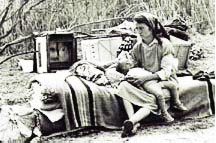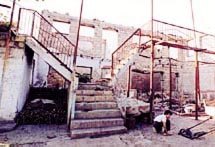|

Winter
1998 (6.4)
Pages
54-55
U.S. Ban on
Aid to Azerbaijan (Section 907)
How It
Started in 1992 and Why It Should be Lifted
by Ambassador
John J. Maresca - First U.S. Mediator
for the Nagorno-Karabakh Conflict
Left: When Armenian military forces captured
Azerbaijani villages beginning in 1992, nearly 1 million Azerbaijanis
were uprooted and had to flee from their lives. The lucky ones
were able to take some of their belongings with them.
Right: Destruction caused by the Nagorno-Karabakh
war runs into billions of dollars. Azerbaijanis are now rebuilding
Horadiz, 1997.
The following
is an edited version of a speech delivered on October 2, 1998
at a conference on U.S.-Azerbaijan relations in Washington, D.C.
sponsored by the U.S.-Azerbaijan Chamber of Commerce. The panel
included Tofig Zulfugarov, Azerbaijan's Minister of Foreign Affairs;
Brent Scowcroft, Former National Security Advisor under President
Bush; Ambassador Richard Armitage; and Ambassador Richard Morningstar,
Special Advisor to President Clinton and the Secretary of State
on Caspian Affairs and Energy Diplomacy.
What
is Section 907?
Lisbon
Summit (1996)?
I follow several
distinguished speakers this morning and, therefore, will begin
by emphasizing how much I agree with nearly everything which
has already been said. I do not want to repeat the points which
others have made. My special contribution to this panel is that
I served as the first U.S. Mediator in the conflict over Nagorno-Karabakh.
Therefore, I will focus my remarks on issues related to that
conflict, its consequences for Azerbaijan and the response by
the U.S. government.
As U.S. Ambassador in 1992 to what was then the CSCE (Conference
on the Security and Cooperation of Europe) and now called the
OSCE (Organization on the Security and Cooperation of Europe),
I helped to develop the so-called Minsk Group into a conflict-resolution
mechanism, because this would permit the U.S. to play a leadership
role in a region where we had little presence or leverage. I
felt this was necessary because there was no outside leadership
in the region at the time. In fact, some thought there was only
the negative leadership of Moscow in the form of a rear-guard
action trying to retain or regain control over the Newly Independent
States (NIS) of the Caucasus. Some even felt that elements in
Moscow were aggravating the Nagorno-Karabakh conflict in order
to bring Azerbaijan back under Russian control.
Creation of Minsk
Group
The
Minsk Group was designed to legitimize a leadership role for
the United States. But back in 1992 American interest in the
region was very low. The oil companies were much more interested
than the U.S. government, which tended to see the Newly Independent
States as a Russian sphere of influence. The U.S. government
had many other concerns with Moscow that they gave higher priority,
and obviously the Administration did not want to overload the
circuits by challenging Russia's influence in the region. For
this reason, Washington's backing for a leadership role in settling
this conflict was weak, especially if contrasted with the U.S.
role in conflicts in Iraq, Somalia, or even in the former Yugoslavia.
Consequently (under the Bush Administration), there was very
limited effort to influence Congressional thinking, or to indicate
that the U.S government was actively seeking an impartial role
in the solution to this conflict. Congress was left to the influence
of lobbyists and as a result Section 907 of the Freedom Support
Act, banning direct aid to the Azerbaijan government, was passed.
Congress was simply ignorant of the issue at the time and of
the implications of their actions. This early failure to inform
and influence Congressional thinking imposes a responsibility
on the present Administration to rectify and correct the results
of that failure.
As soon as I learned of this restricting clause, I warned the
Administration and the public that such legislation was unfair
and would undermine the leadership position I was trying to establish
to enable the U.S. to assist in finding an acceptable solution
to the conflict over Nagorno-Karabakh. The reasons were threefold:
Reasons to Lift
the Ban
1. Section 907 was, and is, grossly unfair. We are a nation which
has a long tradition of trying to prevent or resolve distant
conflicts, and we also try to assist the victims of such conflicts.
There are not "good victims" and "bad victims"-
there are just victims with broken lives. It is the proud tradition
of our country to try to help all such people, regardless of
which side they are on. Section 907 contradicts this tradition
by taking sides in the Nagorno-Karabakh conflict-by saying, in
effect, that Azerbaijani victims are somehow less deserving.
2. If the United States is to play the role of leading mediator,
it must not only be impartial, but it must also be perceived
as impartial. Section 907 contradicts that essential impartiality,
and is correctly viewed by Azerbaijanis as a favorable tilt toward
the Armenian position. This was a severe handicap for U.S. mediators
at the time and remains so today. Section 907 has thus contributed
to the prolongation of the conflict and to the suffering it has
generated.
3. Section 907 assumes that Azerbaijan has played an offensive
role in the conflict over Nagorno-Karabakh. The wording of the
restrictive clause refers to what it calls Azerbaijan's "offensive
uses of force against Armenia and Nagorno-Karabakh." But
clearly Azerbaijan is not conducting offensive uses of force
against anyone. On the contrary, it is Azerbaijan whose territories
have been occupied, resulting in the suffering of hundreds of
thousands of internal refugees. Azerbaijan has been on the defensive
now for at least six years. Section 907 is, therefore, deeply
unjustified and unfair and based entirely on faulty assumptions.
Presidential Waiver
I believe
that the current U.S. Administration has the responsibility,
and the grounds, for waiving Section 907 forthwith. The international
community has confirmed the territorial integrity of Azerbaijan,
including the Nagorno-Karabakh region. This was done in December
1996 at the OSCE Summit in Lisbon, when the Chairman read a statement,
approved by each of the 54 member states except Armenia, and
it was entered into the record. This is a very strong endorsement
of Azerbaijan's position.
What this means is that Azerbaijan's actions in response to the
conflict over Nagorno-Karabakh cannot be "offensive".
A country is not conducting "offensive uses of force"
if it is defending its own territorial integrity. Section 907
permits a waiver of its provisions when the U.S. President determines
that Azerbaijan "is taking demonstrable steps to cease"
what it calls "offensive uses of force" in the conflict.
Since Azerbaijan's position is so obviously defensive, as confirmed
by the OSCE statement, a Presidential waiver can, and should,
be issued on these grounds. It should have been issued a long
time ago. Such action would move the process of resolution of
this conflict one huge step forward.
What is happening now is that an unfair percentage of U.S. assistance
is going to Armenia, [more than $1 billion since 1992] and Azerbaijan
is being treated as though it were solely responsible for the
conflict over Nagorno-Karabakh. This is unjustifiable on its
face, and is out of keeping with U.S. traditions and the U.S.
effort to mediate a solution. A solution based on autonomy for
Nagorno-Karabakh can be found, and it is up to the U.S. to play
a major role in finding it. The first step is to put the U.S.
position on an impartial basis by waiving Section 907.
Role of the Private
Sector
Many private organizations and companies have tried to compensate
for some of the negative effects of Section 907 by contributing
private assistance to Azerbaijan. My company, Unocal, is proud
to have worked with the United Nations High Commissioner for
Refugees (UNHCR) and the International Rescue Committee (IRC)
to develop housing for a number of Azerbaijani refugees from
the Nagorno-Karabakh region. We have also contributed to other
humanitarian assistance programs, and we plan to contribute more.
Others have done the same.
But this does
not compensate for the psychological and real impact of the U.S.
law. Section 907 must be repealed by Congress or waived by the
President, as soon as possible. I would appeal to Ambassador
Morningstar to carry this message back to the Administration,
especially the White House. There is an opportunity for wise
presidential leadership here, and the President should seize
upon it as soon as possible for the benefit of all the peoples
of the Caucasus.
  Section
907 of the Freedom Support Act Section
907 of the Freedom Support Act
The
U.S. Congress passed the Freedom Support Act in the fall of 1992
to facilitate economic and humanitarian aid to the former republics
of the Soviet Union, hoping it would help stabilize democratic
forms of government and foster economic growth. All 15 republics
are eligible for assistance with the exception of Azerbaijan.
The countries that receive aid under this legislation include
Armenia, Belarus, Estonia, Georgia, Kazakhstan, Kyrgyzstan, Latvia,
Lithuania, Moldova, Russia, Tajikistan, Turkmenistan, Ukraine
and Uzbekistan.
Since 1992 the
Armenian government has received more than $1 billion in aid
under this legislation. Azerbaijan's government has received
none. The clause restricting aid to Azerbaijan reads as follows:
Restriction on Assistance to Azerbaijan (Title 9: Section 907)
"United States assistance under this or any other Act .
. . may not be provided to the Government of Azerbaijan until
the President determines, and so reports to the Congress that
the Government of Azerbaijan is taking demonstrable steps to
cease all blockades and other offensive uses of force against
Armenia and Nagorno-Karabakh."
Lisbon
Summit-1996
The
Principles of the Lisbon Declaration regarding a settlement for
Nagorno-Karabakh included in the Chairman's statement recorded
at the Lisbon OSCE Summit are:
(1) Territorial integrity of the Republic of Armenia and the
Azerbaijan Republic;
(2) Legal status of Nagorno-Karabakh based on self-determination
which confers on Nagorno-Karabakh the highest degree of self-rule
within Azerbaijan;
(3) Guaranteed security for Nagorno-Karabakh and its whole population,
including mutual obligations to ensure compliance by all parties
with the provisions of the settlement.
John J. Maresca,
former U.S. Ambassador and Mediator of the Nagorno-Karabakh Conflict
(1992), is currently the Vice-President for International Relations
of the Unocal Corporation.
From
Azerbaijan
International
(6.4) Winter 1998.
© Azerbaijan International 1998. All rights reserved.
Back to Index
AI 6.4 (Winter 1998)
AI Home
| Magazine
Choice | Topics
| Store
| Contact
us
|



